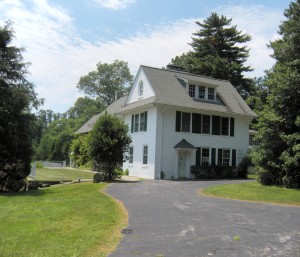Civil Discourse is the formal exchange of reasoned views as to which of several alternative courses of action should be taken to solve a societal problem. It is intended to involve all citizens in the making of the decision, persuade others (through valid information and logic), and clarify what course of action would be most effective in solving the societal problem.
Last night the auditorium of Beaumont Elementary School was standing room only for Easttown Township’s special meeting . . . by my calculations, 250 Easttown residents and Agnes Irwin School (AIS) supporters packed in to the room. After brief remarks from the township supervisors, there was a 20-minute overview of the revised Agnes Irwin School’s proposed playing field plans for the Hawkins Farm. Agnes Irwin head of school, Dr. Mary Seppala spoke about the school and the students, followed by AIS attorney Ross Weiss who explained the contents of the revised playing field plans. Mr. Weiss presented AIS’s new proposed plan; attempting to answer many of the previous concerns of the Hawkins Farm neighbors and other Easttown residents.
A cornerstone of the new proposal was a ‘give-back’ of 58 acres (of the 108 acres) to Easttown. Other new plan components included the creation of $500K fund for the township, whose yearly interest was intended for maintenance of the 58 acres; complete public use of playing fields and tennis courts and a walking trail throughout the property with exercise stations. Mr. Weiss patiently promoted the merits of this new plan and his hope that the supervisors would allow the plan to move to the planning commission.
The supervisors asked Mr. Weiss several general questions and then opened the discussion to the residents for their comments, questions and remarks. The next two hours of this special meeting were remarkable. One after another of the residents spoke with passion and conviction on the proposed playing fields, Although the majority who spoke were in opposition of the proposed playing fields, there was a minority of Easttown residents who spoke in favor of the proposed plans; many of these supporters with daughters at AIS. The residents frequently clarified their remarks, explaining that the issue was not about AIS. Rather the issue was about changing zoning ordinances to allow a multi-sports complex construction in a residential district. Their concerns remained unchanged as from previous meetings – traffic, safety issues, noise, associated expenses to the township and the potential lowering of property values.
Following the resident’s comments, the supervisors agreed to make a decision on proposed playing field plans. The supervisors had three choices; (1) to remain silent and do nothing; (2) vote against AIS proposed plan or (3) vote to move the AIS proposal on to township Planning Commission and Chester County Planning Commission. The supervisors asked for a 5-minute break to deliberate and then with a few remarks, once again in a unanimous vote, made the decision to vote against the proposed plan. In their remarks, several supervisors cited receiving 328 emails and letters from residents and all but 10 were opposing the proposed plan.
Although I was pleased for the many residents who had passionately fought against the playing fields, I received an unexpected bonus from attending this lengthy meeting. I left the meeting with a sense that both sides had presented their cases with civility and respect for the other side and that I had witnessed local government at its best.
Thomas Jefferson and the other founders of the American Republic, considered political discourse to be the heart of democracy. Jefferson noted, “Differences of opinion lead to inquiry, and inquiry to truth.” According to Webster’s dictionary, the concept discourse has two major meanings: (a) formal communication of thoughts about a serious subject through words (spoken or written) and (b) rationality or the ability to reason.
Civil discourse is our ability to have conversation about topics about which we disagree, and our ability to listen to each others’ perspectives. Political discourse is a method of decision-making in a democracy; last night’s special meeting represented local government and civil discourse at its best! I applaud the Agnes Irwin School supporters and the Easttown residents for their thoughtful civil discourse, but above all, Easttown Township’s elected officials receive a standing ovation from my vantage point!



